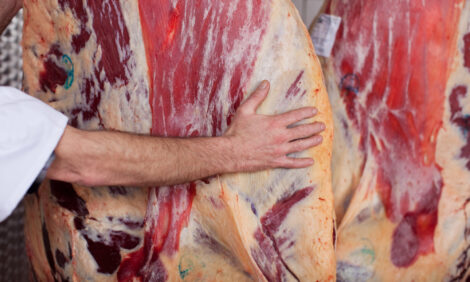



Express® Vaccines Now USDA-approved for Whole-herd Use
ST. JOSEPH, Mo.— Express® and Express® FP modified live IBR, BVD Types 1 and 2, PI3 and BRSV vaccines, have received USDA approval for use in whole-herd vaccination programs. The whole-herd option greatly improves flexibility in vaccinating a pregnant cow and nursing calf provided the cow was vaccinated with Express® FP prior to breeding.
To receive the new approval from USDA, Boehringer Ingelheim Vetmedica, maker of Express® and Express® FP vaccines, conducted extensive real-world safety studies involving more than 3,200 beef cows and calves in commercial cow/calf herds. The results demonstrated no difference in the number of fetal losses from animals vaccinated prior to and during pregnancy with Express FP vs. animals vaccinated with only Lepto during pregnancy. There were no fetal losses due to IBR or BVD viruses.
Additional testing on newborns from cows that had been vaccinated during pregnancy also showed no detectable risk of vaccine virus being passed to the fetus.
Previous safety studies have demonstrated that calves vaccinated with Express® did not shed the IBR, BVD Type 1 or BVD Type 2 virus components in the vaccine. This new round of studies provides another layer of assurance, demonstrating that even if previously vaccinated pregnant cows were to be exposed to the vaccine virus through a nursing calf that had been vaccinated, it would pose no significant risk to the developing fetus, says Dr. Carol Rinehart, PhD, bovine vaccines manager for the company.
"Our past research has proven Express® FP vaccine has the industry’s best efficacy record in protecting unborn calves from persistent BVD infection," says Dr. Rinehart, lead investigator on the new safety trials. "Now, this new round of research demonstrates Express® FP also offers a high assurance of safety to go along with that effectiveness."
Offers a New Opportunity for Vaccination
"Having the ability to use Express® MLV vaccines in calves nursing cows previously vaccinated with Express® FP, allows us to start a modified live virus vaccination program early in life and allows the calves to develop more complete immunity against the key viral causes of bovine respiratory disease prior to the stress of weaning," says Dr. Craig Jones, DVM, Associate Director of Cattle Professional Services for Boehringer Ingelheim Vetmedica.
Dr. Rinehart concurs: "We’ve known for years that vaccinating at times of stress, whether it’s at weaning or receiving, risks compromising the effectiveness of even the best vaccine. By removing this traditional hurdle to vaccinating while calves are in the relatively comfortable environment of nursing their mother cows, we give an already effective vaccine all the better opportunity to enhance protection in those animals."
Dr. Jones believes the whole-herd option now available with Express® and Express® FP vaccines improves our ability to control the viruses that commonly cause reproductive losses and bovine respiratory disease and does allow for some flexibility for vaccinating the cow-calf herd. However, the ideal time to vaccinate cows with a modified live virus vaccine is approximately 30 days prior to breeding.
"The industry has come to realize that preventing persistent infection is a critical component of controlling BVD in a herd. Vaccinating prior to breeding will provide higher immunity early in gestation when the threat of fetal infections is the greatest.
"The better immunity we can build in the cow herd," Dr. Jones explains, "the better resistance we have to disease, the less circulation of disease organisms, and the better the overall health of the herd.
"Starting every calf out right—giving the first vaccination while it's still nursing, so it can start to develop an immune response early, followed by another vaccination prior to or at weaning to boost that immunity—combined with vaccination of cows and heifers, is important in controlling disease in the herd."
Safety Studies
Because using modified-live viral vaccines in or around pregnant cows has been a sensitive issue in the past, Boehringer Ingelheim Vetmedica felt a responsibility to devote additional resources to test the Express® vaccine above and beyond the minimum standards required by USDA, says Dr. Rinehart. Her trials invested in enrolling about 35 percent more cows and 30 percent more calves than the agency required.
"One of the unfortunate facts of life in the past has been that manufacturers of modified live BVD vaccines have often been faced with choosing between effectiveness and safety: If you wanted a very safe vaccine, usually it was less efficacious. If you wanted higher effectiveness, often that effectiveness was purchased at the price of safety," she says.
"With Express® FP, we have found the perfect combination of both: Excellent efficacy and an excellent safety record."
The safety in pregnant cows and heifers was demonstrated in a field study that utilized cattle from three separate Nebraska cow/calf herds of about 550 to 600 cows in size, along with a serological study from a fourth Canadian herd. All cows and heifers enrolled in the study were vaccinated prior to breeding with Express® FP 10, containing modified-live IBR, BVD 1, BVD 2, PI3 and BRSV, along with Leptospira canicola, grippotyphosa, hardjo, icterohaemorrhagiae and pomona bacterin. About one-third of the enrolled cattle were assigned to each of one of the three trimesters.
After researchers confirmed a female was pregnant, they gave her a second vaccination during the assigned trimester. Half of each trimester group was given Express® FP 10 and half was given only the Lepto 5 bacterin. All cattle were watched closely, any fetal losses were recorded, and fetuses were subjected to a full autopsy if they could be recovered. Calves were also followed for 30 days following birth to watch for any signs of ill health.
Fetal losses were statistically identical in both treatment groups, and in fact were actually numerically higher for the unvaccinated controls in two of the three trimester groups. None of the fetal losses were diagnosed as due to IBR or BVD. No differences were noted in the health status of the calves.
In addition, researchers conducted a separate newborn calf serology study on 120 calves born to dams revaccinated in the second or third trimester. In calves whose blood was checked before they were able to nurse the vaccinated cows, none showed antibodies to BVD Types 1 or 2 or to IBR, which would indicate they had been exposed to the viruses while in the womb.
The Express® FP family is the first, and currently only, vaccine line to earn the prevention of BVD Type 1 and Type 2 persistently infected calves label claim – the highest label claim awarded to any vaccine with a PI claim to date by the USDA. The prevention of PI calves label claim is only granted to a product that has demonstrated a high degree of efficacy in preventing PI calves caused by BVD Type 1 or Type 2 in vaccinated and challenged cows and heifers.
Other BVD vaccines carry PI claims, but only Express® FP has the prevention of PI claim. The other lesser claims that the USDA has granted are "aids in prevention" or "aids in disease control". Both require a lower degree of efficacy than the prevention of BVD persistent infection claim. The Express® FP vaccine family is backed by a written guarantee that states Boehringer Ingelheim Vetmedica, Inc. will purchase any persistently infected calf born to any non-PI cow that has been vaccinated prior to breeding with Express® FP according to label directions.
Further Reading
| - | Find out more information on BVD by clicking here. |
| TheCattleSite News Desk | Read more Boehringer Ingelheim News here |


